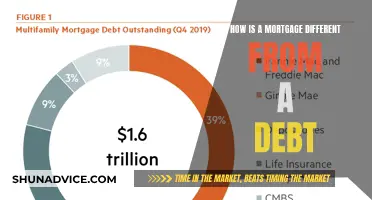
Your FICO score is an important factor in getting a mortgage. FICO scores are a global standard for measuring credit risk in the banking and mortgage industries. While there is no single minimum FICO score requirement, higher scores generally mean better loan terms and lower interest rates. Lenders use different scoring models to determine eligibility, and FICO itself has many versions, with FICO 5 being the most commonly used for mortgages. A FICO score of at least 670 is generally considered good, but different lenders have different requirements.
What You'll Learn
- FICO score requirements vary by lender and mortgage type
- Higher scores generally lead to lower interest rates
- FICO 5 is the most commonly used scoring model for mortgages
- Payment history is the most important factor in determining your FICO score
- A lower score may make it harder to qualify for a mortgage

FICO score requirements vary by lender and mortgage type
FICO scores are an important factor in getting a mortgage, as they affect the loan terms and interest rates offered by lenders. While a higher score is generally favourable, there is no single minimum FICO score requirement across all lenders and mortgage types. Each lender can set their own criteria, and they may use different scoring models to evaluate mortgage applications.
Mortgage lenders typically use FICO Scores from each credit bureau to determine loan eligibility and terms. The most commonly used FICO Scores in the mortgage lending industry are FICO Score 2, FICO Score 4, and FICO Score 5. Lenders may also use FICO Score 8 or other industry-specific scores, such as FICO Auto Score for auto loans. FICO Scores range from 300 to 850, with a score of 670 or above considered good. However, different lenders can set their own minimum score requirements, and these may vary depending on the type of mortgage being offered.
For example, government-backed mortgages like Veterans Affairs (VA) loans do not have a minimum credit score requirement set by the program. Still, individual VA lenders may require a credit score of at least 620. On the other hand, conventional loans typically require a higher loan-to-value (LTV) ratio, such as 80% LTV, to avoid paying private mortgage insurance. This means that the borrower must have a higher down payment or equity in the home.
Additionally, lenders may have unique assessments and pricing grids that consider various factors beyond just the FICO score. These factors can include the loan amount, down payment, employment history, residential history, and other credit scores or reports. As a result, it is important for borrowers to shop around for a mortgage and understand the specific requirements and criteria of different lenders and mortgage types.
While there is no one-size-fits-all answer to the question of the required FICO score for a mortgage, borrowers can improve their chances of obtaining favourable loan terms by working on achieving and maintaining a good credit score. This includes paying bills on time, maintaining a low credit card balance, and ensuring a positive credit history.
Mortgage Borrowing: When Is It Too Much?
You may want to see also

Higher scores generally lead to lower interest rates
A higher FICO score generally leads to lower interest rates on a mortgage. FICO scores are a global standard for measuring credit risk in the banking and mortgage industries, and higher scores are an indicator of lower credit risk. Lenders will use a pricing grid to determine how your credit score affects your interest rate. A higher score will usually mean a lower interest rate, and vice versa.
Mortgage lenders will also use FICO scores to determine your loan eligibility and terms. A higher score will usually mean better loan terms. Lenders will also use FICO scores to determine the credit risk for different types of debt. For example, if you are applying for an auto loan, the lender will likely use the FICO Auto Score model, which is designed for car loans.
FICO scores range from 300 to 850, and a score of at least 670 is generally considered good. However, different lenders can set the bar higher or lower based on their own criteria. A higher score will generally qualify you for a lower interest rate when you get a mortgage. For example, if you have a high score, you may be able to get a competitive rate on a conventional loan.
Additionally, a higher score can make it easier to qualify for a loan in the first place. A lower score may make it harder to qualify and will usually result in a higher interest rate. Even a small difference in your score can make a big difference in the cost of your loan. For example, if you have a higher score, you may save a significant amount in total interest over the life of your loan.
The High Cost of Mansion Mortgages: Average or Exception?
You may want to see also

FICO 5 is the most commonly used scoring model for mortgages
When it comes to mortgages, there is no single minimum FICO® score requirement. This is because there are many different types of mortgages and lenders, each with its own criteria. However, it is generally understood that better FICO scores lead to better loan terms. A FICO score of 670 or higher is typically considered good.
FICO 5 is sourced exclusively from the credit reporting agency Equifax, one of the three major credit bureaus. In contrast, FICO 8 draws information from all three major credit bureaus. FICO 8 is more commonly used by credit card companies as it is more forgiving of one-off late payments and takes into account low credit card balances on active cards.
While FICO 5 is the most prevalent scoring model for mortgages, lenders may also refer to FICO Score 2 or FICO Score 4 when evaluating mortgage applications. These scores are sourced from Experian and TransUnion, respectively. Ultimately, it is up to the lender to decide which credit score they will use and what other financial information they will consider.
Mortgages: Understanding the High Cost of $1800 Monthly Payments
You may want to see also

Payment history is the most important factor in determining your FICO score
While there is no single minimum FICO score requirement for a mortgage, it is important to have a good credit score to secure better loan terms. Payment history is the most important factor in determining your FICO score. It accounts for 35% of your total score and is a record of your payment behaviour on all credit accounts. Lenders want to know whether you've paid your existing accounts on time, which helps them determine how much risk they will assume by approving your credit application.
Your payment history gives lenders a snapshot of how you paid your bills. They want to know if you paid on time, missed any payments, or if your debt was sent to collections. If you often miss payments, your score will suffer, and lenders will consider you a high-risk borrower. Conversely, paying all your bills on time will result in a good payment history, which will positively impact your score.
The longer you pay your bills on time, the more your FICO score will increase. Even if you have had late payments in the past, getting current on missed payments can improve your score. The older a credit problem is, the less it counts toward your credit score. However, late payments can affect your score if you are more than 30 days past due. After 30 days, the late payment will show up in your payment history, and the longer you go without paying, the worse it is for your score.
To improve your payment history, it is important to pay your bills on time and set up a budget to ensure you have the necessary funds. It may also be helpful to contact your creditors to see if they can lower your interest rate so you can pay off your debt faster. Additionally, meeting with a credit counselling service can provide guidance on budgeting and consolidating your debts, which can help improve your credit history.

A lower score may make it harder to qualify for a mortgage
A lower FICO score may make it harder to qualify for a mortgage. FICO scores range from 300 to 850, with scores of 670 and above generally considered good. A higher score indicates better loan terms and lower interest rates to lenders, who tend to be more cautious with mortgages as they are very large loans. As such, a lower score may result in a higher interest rate.
Lenders will also consider other factors, such as your payment history, debt-to-income ratio, employment history, and residential history. However, FICO scores are a significant factor in determining your eligibility for a mortgage and the interest rate you will pay.
If you have a low FICO score, it is important to search for a knowledgeable loan officer or mortgage broker who can guide you toward the right loan type. There are mortgage programs available for borrowers with low credit scores, such as manually underwritten HomeReady mortgage loans offered by Fannie Mae. These programs can provide an alternative path to homeownership for those with lower credit scores.
Additionally, you may be able to improve your FICO score before applying for a mortgage. This can be done by paying bills on time, maintaining a low credit card balance, and ensuring you have a good mix of credit types. By taking steps to improve your creditworthiness, you may be able to access better loan terms and interest rates.
Frequently asked questions
There is no single minimum FICO score requirement for a mortgage, as different lenders have different requirements for their loans. Generally, a higher score means a lower interest rate. A FICO score of 670 or above is considered good, but lenders can set the bar higher or lower based on their own criteria.
FICO score is a numerical measure of your creditworthiness, based on factors like payment history, total debt, types of credit used, and length of credit history. It is a widely used credit scoring model, with 90% of lenders using it.
Paying your bills on time and reducing your credit card balance are good ways to improve your FICO score.
Most mortgage lenders use FICO Credit Scores 2, 4, or 5 when assessing applicants. The FICO 5 score is the most commonly used in the mortgage-lending industry.
A higher FICO score generally leads to a lower mortgage rate, as lenders perceive you as a lower-risk borrower. A lower score may make it harder to qualify for a loan and can result in a higher interest rate.







